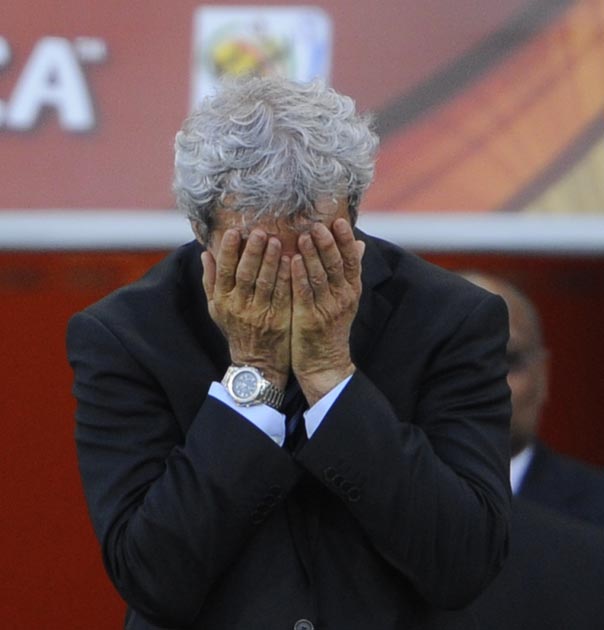Domenech gets a grilling from the French government

The French government yesterday denied any political interference in their national team's affairs but kept debating the side's World Cup debacle amid a suspension threat by Fifa.
The world governing body's president Sepp Blatter said on Tuesday that Fifa could suspend the French Football Federation if politicians kept meddling in the game, meaning the country could be banned from international tournaments and its clubs from European competitions.
"There was never any question of the French government interfering in the affairs of the FFF," government spokesman Luc Chatel said yesterday. FFF president Jean-Pierre Escalettes resigned on Monday in the wake of France's disastrous showing in South Africa, saying the decision was his own, but sports minister Roselyne Bachelot had said last week his resignation was "unavoidable".
Bachelot appeared before a parliamentary commission on Tuesday, and yesterday Escalettes and outgoing coach Raymond Domenech did the same. "She (Bachelot) indeed indicated that she personally believed his resignation was unavoidable but she did not ask for his resignation," Chatel said. "It is normal for members of parliament to try to find out exactly what happened because it is a topic that preoccupies French people," he added.
France left the World Cup at the group stage after a campaign rocked by the players' decision to boycott a training session in support of striker Nicolas Anelka, who was sent home for insulting Domenech.
The players, who eventually left the World Cup in disgrace with just one point and one goal from three group matches, would not listen and continued the boycott to protest against the FFF decision to kick out Anelka after he had insulted Domenech.
Escalettes and Domenech told the commission they had tried their best to reason with the rebellious players. "Escalettes told us they faced a wall [of opposition], something he had never experienced in over 50 years in football, and they could not make it fall," said commission member Lionel Tardy after the private hearing. "For him, something was broken that day."
Domenech, whose lack of authority and vision were exposed at the World Cup, told the commission that French sports daily L'Equipe had contributed to the team's collapse by printing Anelka's crude insults on its front page.
France's World Cup disaster will be back under the spotlight on Friday with a meeting of the FFF council.
Join our commenting forum
Join thought-provoking conversations, follow other Independent readers and see their replies
Comments
Bookmark popover
Removed from bookmarks